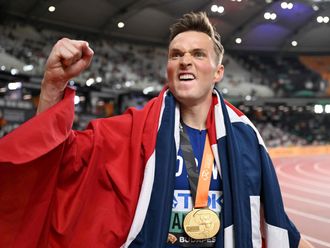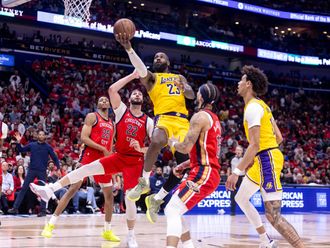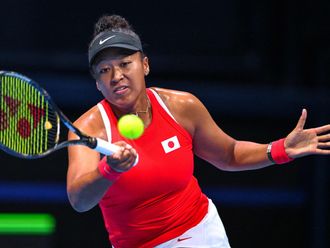Rio de Janeiro: LaShawn Merritt ran a blistering anchor leg to return the men’s 4x400m title to the United States, and win his third Olympic gold medal, in the final athletics event of the Rio Games on Saturday.
Before Matthew Centrowitz’s shock victory in the 1,500m earlier in the evening, the American men had been limited to one gold medal on the Rio track through Kerron Clement in the 400 metres hurdles.
The US have never gone two Games without winning the men’s one-lap relay, however, and after being upset by the Bahamas in London four years ago, were determined to secure the title for a 17th time.
Arman Hall, Tony McQuay and Gil Roberts combined over the first three laps to give Merritt a two metre lead and the former 400m Olympic and world champion extended that to seven to win in two minutes, 57.30 seconds.
“This was about Team USA, a great bunch of guys that I work with,” said Merritt.
“The guys made it easy for me. We wanted this gold, I’ve been running a lot but I was going to give that anchor leg all I had. Every man did his job and we’re bring that gold back to the US” Javon Francis stormed down the final straight to give Jamaica the silver in 2:58.16, while the Bahamas ran 2:58.49 to pip Belgium, who ran a national record 2:58.52, for bronze.
“I have only good feelings,” said Francis. “I said to myself ‘Usain Bolt did it’ so I need to work for a medal.” Merritt, who arrived in Rio with hopes of an individual 400-200 double, will return to home with a second career 4x400m relay gold and a bronze from the one-lap event.
“For me, this is what the Olympics are all about, representing your country,” he added. “I went for it every time I went on the track.” Chris Brown anchored the Bahamas team to win a record fourth medal in the event after a gold in 2012, silver in 2008 and a bronze in the 2000 Sydney Games.
Kevin Borlee, who was running in the Belgium team with his brothers Jonathan and Dylan, said it was tough to miss out on a medal by 0.03 seconds.
“It’s hard now but in a couple of days I think there will be only good memories,” he said.
“It’s the Olympic Games, we had the chance to compete, we enjoyed it and hopefully we will be back.”
Spaniard Ruth Beitia leapt into the Rio night to win Spain’s first Olympic gold medal in women’s athletics and claim her first global outdoor high jump crown at the age of 37 on Saturday.
The three-times European champion cleared 1.88m, 1.93m and 1.97m at her first attempts and became the oldest Olympic champion in the jumps on countback when all four remaining athletes failed to get over two metres.
“I’m happy,” she said. “Never did I think I’d be competing again after the London Olympics. My dream has become a reality.” Mirela Demireva of Bulgaria took silver ahead of 32-year-old former world champion Blanka Vlasic of Croatia, who added bronze to the silver she won at the 2008 Beijing Olympics.
American mother-of-three Chaunte Lowe was the one jumper of the quartet who cleared 1.97m to miss out on a medal.
Like 32-year-old Lowe, Beitia was appearing at her fourth Olympics having finished 16th in Athens, seventh in Beijing and fourth in London.
She always looked like continuing her upward trajectory in Rio after clearing 1.88m with a minimum of fuss.
Extending her arms out in front her body and twitching her fingers before starting her run, Beitia charged towards the bar with her ponytail bouncing behind her before also successfully clearing the next two heights.
Beitia became the oldest medallist in the women’s high jump by six years and was also a year older than Heike Drechsler when the German won long jump gold at the Sydney Olympics.
“I’m aware that I’m 37 years old,” she said. “I think I’m one of the oldest women to win an Olympic gold medal. Of course, I’m very proud to still be continuing up to now. Even at my age, I have the same enthusiasm and happiness.” Twice world champion Vlasic also made her Olympic debut in Athens in 2004 but missed the London Olympics because of the Achilles problem that has blighted the latter part of her career.
Vlasic returned to competition this year but was clearly still feeling the injury in her third Games.
“This medal is a badge of honour, it’s a reward for being brave given the circumstances,” she said.
“The doctor didn’t tell me to stay out of the Olympics, but they told me it would hurt, and it did.”











